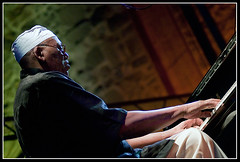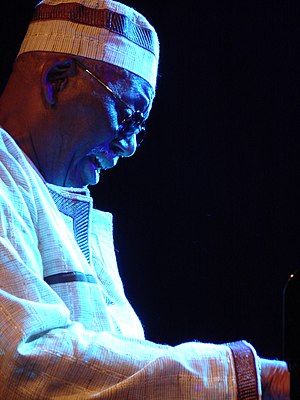 Cover of Randy WestonImmersed in African rhythms
Cover of Randy WestonImmersed in African rhythmsBy Geoffrey Himes Friday, April 8, 2011
Most people agree that much of American music — blues, jazz, R&B, hip- hop and gospel — has its roots in Africa, but for many that formula is a vague, sentimental notion, rarely explored and little understood. For pianist Randy Weston, however, that linkage has been the central theme of his music for more than 50 years.
The 85-year-old pianist, who performs at the Kennedy Center on Saturday, has composed jazz suites about Africa, studied African history, collaborated with African musicians, performed across the continent and even lived in Morocco for five years.
“Everybody loves jazz and blues, all these rhythms, and it all comes from Africa,” Weston says. “Africa has always been a mystery, because there’s so little information about what it was like before the people from the north invaded, but you have to know something about Africa to know the human race, because that’s where it started. When I go to Africa, I don’t go as a teacher; I go as a student. I want to find out why I play the way I play.”
Weston is coming to town with a new album, “The Storyteller,” and a new book, “African Rhythms: The Autobiography of Randy Weston,” co-written by Rockville jazz writer Willard Jenkins. In the book, Weston describes how his fascination with Africa began with an unusual childhood. As a boy in the 1930s, when most Americans’ images of Africa came from Tarzan movies, he was reading books about ancient African kingdoms. His father was a fervent follower of Marcus Garvey, who advocated pride, unity and self-determination for the entire African diaspora.
“The way I was raised made me a much older person,” Weston says on the phone from his home in Brooklyn. “It made me realize that our civilization went back for centuries, that our history didn’t just begin with slavery. I wanted to know how my ancestors could come here in chains to pick cotton and still produce such incredible music. They suffered so much to make it possible for Randy Weston to play the piano, so I have to respect them. To deny them would be to disrespect their efforts.”
By 1960, Weston had recorded 10 albums and established himself as a worthy heir to the jazz-piano tradition of Duke Ellington and Thelonious Monk. But he hadn’t musically addressed his fascination with Africa. By that decade, however, the civil rights movement in the United States was gathering steam at the same time as the freedom movement in colonial Africa (17 nations would declare their independence that year).
So Weston composed a five-part suite, “Uhuru Afrika” (Swahili for “Freedom Africa”), with help from lyricist Langston Hughes and arranger Melba Liston. They recorded the piece with a 27-member big band that featured Freddie Hubbard, Yusef Lateef, Clark Terry, Kenny Burrell, Max Roach and actor-singer Brock Peters. It was a landmark recording that only whetted Weston’s appetite for further explorations of his African heritage.
Event Information
DETAILS: 7:30pmSaturday, April 9
INFORMATION: 202-467- 4600, 800-
444-1324
PRICE: $30
The John F. Kennedy Center for the Performing Arts 2700 F St. NW Washington, DC
Location
Like
Terms of Use
He joined a State Department-sponsored tour of Africa in 1961 and another in 1964, and in 1967 moved to Morocco.
“Everywhere I went, I always asked for the most traditional music and the oldest musicians,” Weston recalls. “Jazz is a very young music and America is a very young country, so to gain some perspective you have to go all the way back to where it came from. Like my father and mother, these old musicians have secrets we’ll never fully understand because they lived in a time before us. But we can always learn something from their experiences, so I try to be around the elders as much as possible.”
Willard Jenkins, a frequent contributor to Jazz Times and Downbeat magazines, recognized that Weston had an important story to tell.
“What drew me in Randy’s direction is that I’ve always felt that he’s been underappreciated, perhaps because he was out of the country during a crucial period of his development,” Jenkins says. “He was the only major jazz artist that I know of who actually lived in Africa. It was as if he were on a journey of self-discovery.”
The book is told in Weston’s voice, but it was Jenkins who guided the many interviews over nine years and molded the results into a narrative arc.
“I worked with Willard like I did with Melba [Liston],” Weston says. “He’d turn on the tape recorder, I’d go, ‘Blah, blah, blah,’ and he’d take it away and arrange it. It was the same with Melba; I’d play a piano piece and I’d say, ‘This might be a saxophone solo; this might be for trumpet,’ and she would take it away and arrange it. She had a way of hearing what I did, adding colors and making it sound like me.”
Weston’s album “The Storyteller” was recorded live in 2009 and released late last year. Because it was intended to complement the autobiography, it touches on several scenes from the book. It opens with a solo piano piece titled “Chano Pozo,” the Cuban drummer whose injection of African rhythms into Dizzy Gillespie’s band stimulated Weston’s interest in the roots of jazz. The album revisits such major Weston pieces as “African Sunrise,” “African Cookbook” and Weston’s most recorded composition, “Hi-Fly.” And its title reflects a lesson Weston learned from his time in Africa.
“In Western music,” he says, “to be a master all you have to do is play good — be a great pianist or a great saxophonist — but in Africa, to be a master you also have to be a healer, a naturalist and a storyteller.”
Now that he’s 85, Weston himself is one of those storytelling elders, though he laughingly scoffs at the notion, insisting, “I’m still a baby trying to understand the origin of music, the meaning of music.”




